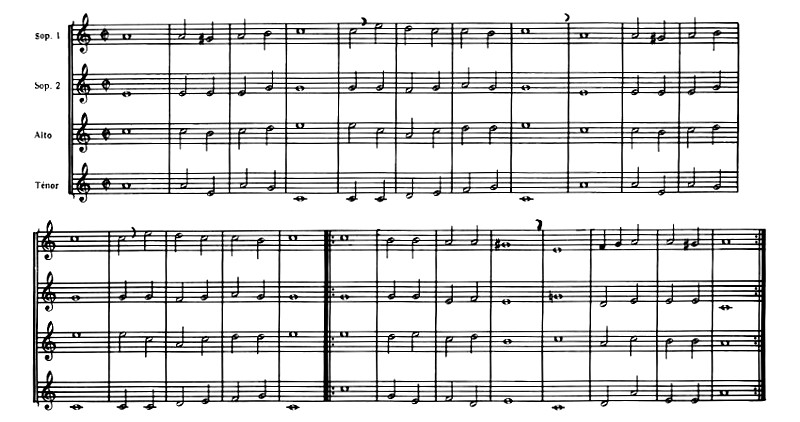

This is a pavane published in a dance manual called Orchesography in 1588. Because it's so easy, the pavane is one of the first dances a medievalist learns. Because of the simplicity of its tune, this particular pavane is one of the first dances a recorder player in a medievalist group learns to perform.
Here is the original French text, although it varies slightly from source to source. The last couplet of each verse should be sung twice.
| 1. |
Belle, qui tiens ma vie Captive dans tes yeux, Qui m'as l'âme ravie D'un souris gracieux Viens tôt me secourir Ou me faudra mourir. |
5. |
Approche-toi, ma belle, Approche-toi, mon bien. Ne me sois plus rebelle Puisque mon coeur est tien. Pour mon mal apaiser, Donne-moi un baiser. |
|
| 2. |
Porquois fuis-tu, mignarde, Si je suis près de toi, Quand tes yeux je regarde Je me perds dedans moi, Car tes pefections Changent mes actions. |
6. |
Je meurs, mon Angelette, Je meurs en te baisant Ta bouche tant doucette Va mon bien ravissant A ce coup mes esprits Sont tous d'amour epris. |
|
| 3. |
Ta beauté et tes grâces Et ton divin propos Ont échauffé la glace Qui me gelait les os, Ils ont rempli mon coeur D'une amoureuse ardeur. |
7. |
Plutot on verra l'onde Contremont reculer, Et plutot l'oeil du monde Cessera de bruler, Que l'amour qui m'epoint Decroisse d'un seul point. |
|
| 4. |
Mon ame voulait etre Libre de passion, Mais l'amour s'est fait maitre De mes affections Et a mis sous sa loi Et mon coeur et ma foi. |
Here is my translation from the French to Latin. Whenever possible, I've used the Latin word which is its ancestor to translate each French word, and preserved the original word order as well. Exceptions were made when the original Latin word differs too much in meaning, or the French word order would force the accents to fall on the wrong syllables.
| 1. |
Bella, qui tenet vitam Captivam oculis, Qui animam rapuit Subrisu grato, Veni et succurre Aut certe moriar. |
5. |
Appropinqua, mea bella, Appropinqua, mea bona. Noli resistere, Quod cor est tuum. Mala remittere, Da mihi basium. |
|
| 2. |
Cur fugis, delicata, Si propinquo tibi? Oculis vidente, In sese perdo. Tua pefectio Mea facta inspirat. |
6. |
Morior, Angelina, Morior in basio. Tua bucca, tam dulcis, Mea cara, rapit me. Ad tactum, spiritus Amorem tuam appetunt. |
|
| 3. |
Pulchritudo tua Et divina gratia Glaciem dissolverunt Quam gelat ossa. Repleverunt cordem Ardore amorosa. |
7. |
Ante verberans unda Contra recurrent, Ante vigilans luna Splendere cessat, Quam amor remittet Suum manum in me. |
|
| 4. |
Anima voluit esse Libera passionis, Sed amor magister Affectionis, Et cordis mei lex Et fidei meae rex. |
Finally, here's my English translation of the French. It's as close to a literal translation as I can get and still produce something that can be sung to the original tune.
| 1. |
Beauty, who holds my life A captive in thy eyes, Who hath my soul enraptured With but a gracious smile, Come soon and rescue me Or I will surely die. |
5. |
Come near to me, my beauty, Come near to me, my dear. Do not resist me further, Because my heart is thine. You turn my pain to bliss, When you give me a kiss. |
|
| 2. |
Why dost thou flee, my dainty, When I am near to thee? When I behold thy eyes, I'm lost within myself, Because thy perfection Inspires my actions. |
6. |
I die, my little angel, I die when kissing thee. Thy mouth, as sweet as honey, My dear, entrances me. That touch my soul sends high On wings of love into the sky. |
|
| 3. |
Thy beauty and thy grace, And thy divine intent, Have thawed away the ice My bones were frozen in. They've filled my heart entire With a loving heat and fire. |
7. |
Sooner will every roller Recoil to the sea, Sooner will silver Luna Give up her brillancy, Than love will ever lose A finger of its grip on me! |
|
| 4. |
My soul had wanted freedom From passion's slavery, But love became the master Of my inconstancy, And put my faith and heart Under its regent art. |